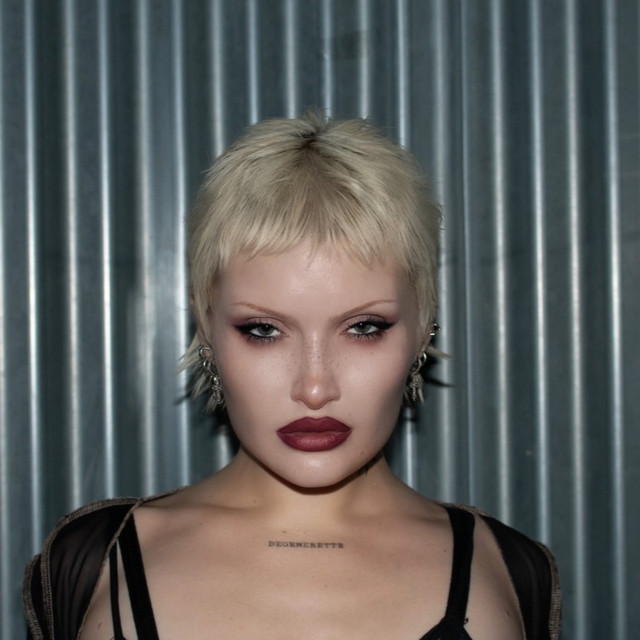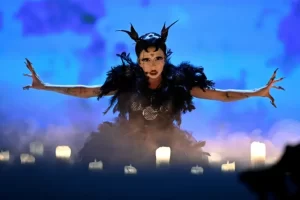
Cassyette, the Brighton-based rock artist, has taken the music world by storm with her unique blend of genres and deeply personal lyrics. Over the past four years, she has navigated profound personal challenges, including the sudden death of her father in 2020. This tragedy triggered a tumultuous period marked by substance abuse and struggles with bipolar disorder, all while her music career began to flourish.
In the midst of this chaos, Cassyette crafted her debut album, pouring her raw experiences into 15 intense tracks that traverse rock, emo, pop, screamo, and nu metal. “It all just spewed out,” she reflects. “There are songs I created during high episodes of mania, and others from my deepest lows. Darkness is a recurring theme throughout the album, reflecting my state of mind during its creation, but there are various shades of that darkness.”

Her debut album, This World [Expletive] Sucks, showcases this spectrum of emotions. Tracks like “Sugar Rush” capture the highs and thrills of addiction, while “Porcelain” addresses life’s fragility with crushing guitar riffs and heavy chords. Cassyette’s unfiltered honesty shines through in her album title, a testament to her raw emotional state at the time.
Born Cassy Brooking in Essex during the mid-1990s, she began her musical journey as a convent-educated clarinet student. It wasn’t until she discovered bands like Paramore, Korn, and Black Sabbath that she found her true musical calling. As a queer teenager in a strict religious setting, Cassyette often felt like an outsider. The dramatic, larger-than-life personas of bands like Motley Crue offered a glimpse into a world where she could belong.

A chance encounter with a neighbor, a producer with an extensive guitar collection, proved pivotal. He needed a female vocalist for a “dark musical” he was working on, and Cassyette’s distinctive voice—powerful and emotionally charged—was a perfect fit. After studying songwriting at university, she transitioned into a DJ role, performing at iconic venues like Torture Garden and Sink The Pink. These experiences infused her music with a raw energy, blending electronic textures with aggressive guitar riffs.
Cassyette’s rise to fame accelerated during the pandemic, largely due to her viral presence on TikTok. Her dynamic covers, including a powerful rendition of Lady Gaga’s songs, drew significant attention. Early singles such as “Dear Goth” and “Prison Purse” impressed music legends like Debbie Harry and Liam Howlett of The Prodigy, the latter of whom contributed to her 2022 single “Boom.”

Her growing popularity led to performances at major festivals like Glastonbury and Download, and an unexpected tour opportunity with Bryan Adams. “It’s a pretty different audience,” she admits with a laugh. “But I played some of my more mellow, heartfelt songs, and it was a really pleasant experience.” She even developed a close bond with Adams, who continues to check in on her.
In addition to her solo success, Cassyette also made waves at the Eurovision Song Contest. She co-wrote the gothic track “Doomsday Blue” for Irish artist Bambie Thug, a project born out of a spontaneous idea. “It was crazy to see Bambie make it happen,” she says, highlighting their punk spirit and artistry. The song secured a sixth-place finish and introduced Cassyette to Eurovision alumni Jedward, who have since become enthusiastic supporters of her work.
Despite her success, Cassyette’s music often delves into the personal and the painful. Her track “When She Told Me” provides a harrowing account of the moment she learned about her father’s unexpected death—a moment so intense it felt like her world literally flipped upside down. “It was a real phenomenon,” she explains, describing how her vision became distorted and disorienting.

For Cassyette, music serves as a form of therapy, allowing her to process and articulate complex emotions. She often writes songs based on physical sensations and emotions she can’t initially understand, using her art to explore and communicate her inner world. This connection with her audience is profound, with many fans reaching out to share their own struggles.
“I’m here for you, but I’m not a qualified therapist,” she says. Recognizing her role, she’s started to equip herself with resources for those in need of professional help, emphasizing that while her music might provide solace, it’s important for fans to seek further support.
As Cassyette continues to push boundaries and defy genre conventions, her music not only reflects her personal journey but also resonates with those who find strength in her candid expression. Despite the challenges, her impact on the music scene is undeniably significant, suggesting that perhaps, the world doesn’t suck so much after all.





